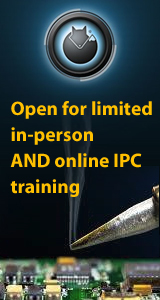The session, “Product Sustainability: Managing Tin Whiskers and Product Lifecycle Analysis,” will help engineers and managers mitigate the development of the growing phenomenon of tin whiskers. Research paper presentations from Samuel Platt, Delphi Electronics & Safety, and Aaron Pedigo, NSWC Crane, will identify fundamental mechanisms causing whisker growth and provide insight into processing steps that reduce the potential for damage by whiskers. Jørgen Vos and Santanu Roymoulik, PTC, will address quality and reliability management challenges across the product lifecycle, including advanced compliance management through leveraging of standards such as IPC-1752.
Answering the age-old question of whether voids in solder joints are good or bad things, Bev Christian, Ph.D., Research in Motion, and Dave Hillman, Rockwell Collins, team up in “Minimizing Defects in Assembly Processes.” The session will also include other industry experts who will discuss isolating sources of head-on-pillow defects and using IPC stencil design rules to address fine pitch components.
Components with low under-clearance have often been the subject of product reliability discussions due to their tendency to entrap process chemicals such as flux and cleaning fluids. In “Tackling Lead-Free Solder Alloys,” Karen Tellefsen of Cookson Electronics will explain how QFN packages are prone to tin corrosion, especially at elevated temperature and humidity, and how to mitigate it. Other papers presented during the session will help attendees discover how to enhance SAC composite solders through nano-particle additions and implement new test protocols to evaluate lead-free alloys on the basis of their physical properties.
To help attendees understand the influence that board strain has on chip component cracking and future quality problems, Steve Davidson, Delphi Electronics & Safety, will present his paper in “Design for Reliability (DFR) and Failure Analysis.” The session will also include papers on various failure modes, high risk assembly processes, and physics of failure principles and other prevention strategies in DFR.
In “Printed Board Fabrication Solutions,” Joe Kane, BAE Systems, will discuss the effect of moisture on electronics assembly scrap and more importantly, how to measure moisture content within printed boards. Other papers in the session will discuss sculpted flex circuits as an electronics packaging solution and HDI training & implementation.
The last technical session on Thursday, September 30, will be “Cleaning Challenges for Electronics Assemblies.” Kyzen Corporation, Rockwell Collins, Precision Analytical Laboratory, and Gen3 Systems Limited will provide operational data for integrating aqueous cleaning equipment/agents and discuss methods to determine cleanliness.
Complete information on the technical sessions at Electronics Midwest, is available at http://www.ElectronicsMidwest.com/IPC-tech-conference. Attendees who register by August 27 can take 20 percent off their registration fees. Other special discount packages registration options may be viewed at http://www.ElectronicsMidwest.com/Reg-Options. Electronics Midwest conference attendees will have free exhibit hall admission to Electronics Midwest, as well as five other co-located events.
About IPC
IPC (www.IPC.org) is a global trade association based in Bannockburn, Ill., dedicated to the competitive excellence and financial success of its 2,700 member companies which represent all facets of the electronics industry, including design, printed board manufacturing, electronics assembly and test. As a member-driven organization and leading source for industry standards, training, market research and public policy advocacy, IPC supports programs to meet the needs of an estimated $1.7 trillion global electronics industry. IPC maintains additional offices in Taos, N.M.; Arlington, Va.; Garden Grove, Calif.; Stockholm, Sweden; Moscow, Russia; and Shanghai, Shenzhen and Beijing, China.
About Canon Communications
Canon Communications LLC (www.cancom.com) is the leading producer of face-to-face, digital, print, and online business acceleration products for the world’s $3 trillion advanced, technology-based manufacturing industry, including medical device, packaging, design engineering, process technology, automated assembly, electronics, quality control, and plastics processing.
 »
»





